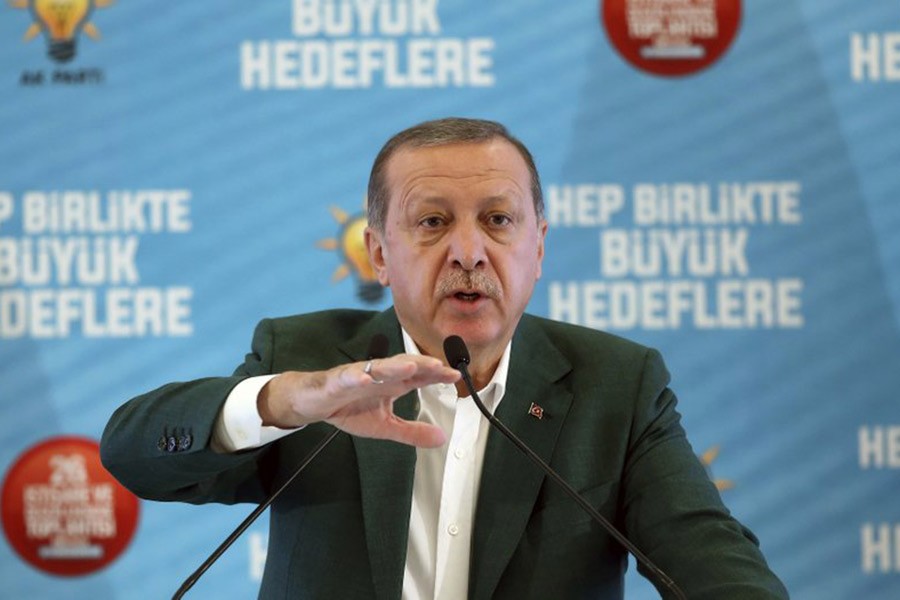Turkey launched a serious operation in Syria’s northwestern Idlib province with Turkey-backed Syrian opposition forces.
Turkish President Recep Tayyip Erdogan made the announcement on Saturday, following international efforts for de-escalation in the war-torn country, reports AP.
The operation was highly expected in the province, where al-Qaida-linked fighters enjoy wide influence, after last month’s talks in the Kazakh capital of Astana during which Turkey, Iran and Russia agreed on setting up “a de-escalation zone” in the province.
Erdogan said the operation was a “new step” to establish security in Idlib, promising Turkey would not desert civilians there.
“Today, there is a serious operation in Idlib and it will continue,” he said at his political party’s conference in Afyonkarahisar province in western Turkey.
Responding to journalists’ questions after the televised speech, Erdogan said: “The Free Syrian Army is leading an operation in Idlib right now,” referring to moderate rebel groups in Syria. He added that the Turkish military was not yet in the province.
Turkey-backed Syrian forces are fighting the al-Qaida-linked Levant Liberation Committee, formerly known as Nusra Front. In the past weeks, the Turkish military has been dispatching tanks and armoured vehicles to the border with Idlib.
A Syrian rebel commander speaking from Turkey said no military operations are ongoing at the moment but said preparations were underway for Turkish troops and FSA fighters to enter Idlib.
“The aim of the operation is to implement the Astana agreement by setting up Turkish observation posts similar to those of Russia,” Lt. Col. Fares al-Bayoush said in an exchange of text messages.
“This cannot be achieved without confronting the Nusra Front,” he said. “The aim is to finish Nusra Front.”
Erdogan told journalists that Turkey would provide security inside Idlib and Russia on the periphery. Last month, a negotiated “de-escalation zone” in the mostly rebel-held province of Idlib was announced during talks in Astana, the capital of Kazakhstan. Iran, Turkey and Russia reached the deal for four de-escalation zones earlier this year as part of their efforts to negotiate an end to the Syrian civil war.
Turkey’s official Anadolu news agency reported that the Turkish “deployment” would be to reach de-escalation goals rather than engage in clashes with local militia or the Syrian army.
The Turkish president warned the country would not permit a “terror corridor” along its border, referring to extremists groups as well as U.S.-backed Syrian Kurdish militants.
“The Idlib operation will allow us new initiatives on this issue,” Erdogan said, referring to Turkey’s aversion to Syrian Kurdish People’s Protection Units or YPG efforts to link up their semi-autonomous territories in northern Syria. Last year, the Turkish army launched a cross-border operation with FSA to clear an area along its border of the Islamic State group and prevent the YPG from gaining a foothold on the western banks of the Euphrates River.
A battle with al-Qaida-linked fighters in Syria could prove costly for Turkey and its allies as the extremist group is powerful and has been crushing any group that might cause any threat to them.
Al-Bayoush also added that there is a split within the al-Qaida-linked Levant Liberation Committee with some saying they should fight Turkish troops and others opposing such a battle.
U.S. officials say that Idlib has become the biggest al-Qaida concentration since the Sept. 11, 2001 attacks in New York and Washington.
Turkey is a strong backer of Syrian opposition fighters while Iran and Russia back President Bashar Assad.
Moscow joined the war two years ago siding with Assad while Tehran has sent thousands of Iran-backed fighters tipping the balance of power in the president’s favour.
In late September, Russian President Vladimir Putin visited Turkey where he discussed the situation in Syria with Turkish President Recep Tayyip Erdogan and earlier this week the Turkish leader went to Tehran.


